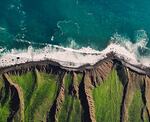rethink sustainability
The Blue Economy - five ways to save our oceans

For World Oceans Day, we celebrate the power of our oceans and look at ways to protect them in order to build a sustainable future. Too often underestimated, oceans are one of our most precious natural resources, covering more than 70% of the Earth’s surface and home to some of the most important of the planet’s life. The oceans feed us, entertain us, are the source of some of our medicines, clean the air we breathe, regulate the climate and much more. In short, they sustain our way of life.
Yet, industrial fishing, offshore oil exploration and using oceans as the world’s dumping ground for plastics and harmful chemicals have placed this fragile ecosystem on a knife’s edge. Our wasteful, idle, lopsided and dirty (WILD) economic model is killing our oceans, which could cost more than USD 400 billion annually by 20501. By living on this “take-make-waste” model, we have endangered our ecosystem and lost essential species.
So now is the time to protect and harness our oceans to secure a sustainable blue economy – by using them and their resources for economic development. According to the World Wildlife Fund, the economic value of our oceans is over USD 24 trillion2, while the UN estimates that they generate around USD 2.5 trillion every year3. This only includes direct economic benefits, and does not take into account the additional benefits in terms of the ocean’s contributions to climate regulation and other ecosystem services mentioned above. There is now overwhelming evidence that the future economic and ecological prosperity of the planet depends on healthy oceans.
From enhanced protection of our oceans, strong limitation of fishing, plant-based alternatives and global CO2 reduction, we look at five ways to support our oceans and their ability to provide the services that we all depend on.
Keeping the oceans healthy will make the planet healthier and support the transition to a Circular, Lean, Inclusive and Clean (CLIC®) economy.
The role of regulations in setting boundaries
Over-fishing, mass tourism and pollution have deteriorated the state of our oceans. Setting and enforcing protected areas, as well as imposing science-based limits to govern how much fish may be removed from the seas, has been shown time and again to allow fish populations to remain healthy, and in some cases increase in size.
Today, just over 2% of the world’s oceans are fully protected4, but the international community has agreed to take action. In a landmark decision at 2022’s COP15 on Biological Diversity, around 190 nations signed up to the so-called ’30 by 30’ initiative, under which at least 30% of coastal and marine areas will be conserved by 2030.
Regulations can reduce the risk of bycatch, mitigate the impact of climate change and protect the oceans ecosystem. France is a major actor for marine conservation with 1/3 of its waters already covered by an MPA.
Rewilding ocean floors aka underwater gardening
Do you know what rewilding is? It’s underwater gardening or reintroducing key plant and animal life into the spaces they are needed and allowing them to grow without human interference. Seagrass meadows, tidal marshes and mangroves5 are the best examples as they can store incredible amounts of carbon. Seagrass, for example, can store 35 times more carbon than rainforests. In the UK, where up to 92% of seagrass has disappeared, recently launched the country’s largest seagrass restoration. By boosting the biodiversity of our oceans and protecting their health, we support fisheries, protect our coastal life and help mitigate the problems of climate change.
Eliminating plastic waste
Plastic pollution is a growing concern both above ground and below water. At least eight million tonnes of plastic end up in our oceans every year, and make up 80% of all marine debris, from surface waters to deep-sea sediments. And let us not forget microplastics, which enter our food chain and contaminate our waters.
Plastic pollution is among the most widespread problems affecting the marine environment, while also contributing to climate change both directly and by disrupting ecosystems and their ability to absorb carbon. Yet global concern and public awareness are increasing, and consumers are calling for alternatives to plastic.
For example, the Indonesian company Evoware is using seaweed instead of plastic for packaging. Plastic Bank, which Lombard Odier is proud to be a partner of, is another example of an innovative solution to the problem of waste. Plastic Bank allows people living in poverty to collect plastic and trade it for material goods. They then reprocess collected plastics for reintroduction into the supply chain. Innovations such as these are contributing to a new way of thinking about plastic, with many in the sector now working to build a new, circular economy for plastics. Lombard Odier is working jointly with the Alliance to End Plastic Waste, a network of the biggest names in the global plastics industry, to direct investment across the plastics value chain in order to promote innovative alternatives to fossil fuel-based plastic, new patterns of use, and the improvement of collection, sorting and recycling. The Lombard Odier Plastic Circularity Strategy aims to drive the global transition towards a circular economy.
Going plant-based
Reducing the use of plastic, regulating over-fishing and rewilding ocean floors is key to building a sustainable economy. Yet reducing our consumption of fish and moving towards a plant-based diet can have an important impact as well.
Amidst ongoing sustainability challenges facing both the meat and fishing industries, alternative sources of protein are in high demand, particularly as consumers reconsider their dietary choices. From plant-based tuna, shrimp made from plants, or plant-based sushi, alternatives to fish are taking a bite into the USD 13.7 billion plant-based industry that thus far has been more popularly known for plant-based meat. The vegan food company Good Catch, for example, has created plant-based tuna that is said to look and taste just the same.
Protecting the carbon sinks
The ocean plays a major role in the regulation of our climate. According to the , oceans absorb nearly 10 billion tonnes of CO2 every year. This represents around 26% of annual human emissions, and is only slightly less than the amount absorbed by our forests and other land-based sources. To put this into perspective, one study found that “oceans absorbed the weight of 2.6 billion Volkswagen Beetle cars in carbon on average each year”6.
Yet, as a result of absorbing all this carbon, oceans have become significantly more acidic since the Industrial Revolution. As a consequence, coral reefs are bleaching around the world, impacting the production of vital seagrass, shellfish and harming marine habitats. Even in a best case scenario, where global warming is limited to no more than 1.5C, coral reefs are projected to decline to 10-30% of their former cover7. Such losses will directly affect the habitat of shellfish. These natural super filters absorb excess carbon dioxide and filter pollutants from the oceans. To stop and reverse ocean acidification, we need to reduce carbon dioxide emissions and progressively lower the concentration of CO2 that is already in the atmosphere.
Protecting natural capital
It is time to protect our natural capital and build a sustainable future. Governments, investors and consumers all have key roles to play to stop ocean acidification and reduce carbon dioxide emissions. This will require a major shift to carbon-free energy such as solar and wind power. We call this new economy the CLIC® economy. And the companies that harness it will be the winners of tomorrow.
1 ocean-report-short-summary-eng.pdf (oceanpanel.org)
2 Ocean and Marine Wildlife Conservation Initiatives (worldwildlife.org)
3 Ocean economy offers a $2.5 trillion export opportunity: UNCTAD report | UNCTAD
4 Oceans need protection now. A new blueprint may help countries reach their goals. | National Geographic
5 Australia marine hotspots found to store 2bn tonnes of 'blue carbon' | Euronews
6 The ocean absorbs billions of tons of carbon every year, and the process is accelerating, study shows | The Seattle Times
7 Paris Agreement limits still catastrophic for coral reefs, research suggests -- ScienceDaily
Wichtige Hinweise.
Die vorliegende Marketingmitteilung wurde von der Bank Lombard Odier & Co AG oder einer Geschäftseinheit der Gruppe (nachstehend “Lombard Odier”) herausgegeben. Sie ist weder für die Abgabe, Veröffentlichung oder Verwendung in Rechtsordnungen bestimmt, in denen eine solche Abgabe, Veröffentlichung oder Verwendung rechtswidrig wäre, noch richtet sie sich an Personen oder Rechtsstrukturen, an die eine entsprechende Abgabe rechtswidrig wäre.
Entdecken Sie mehr.





teilen.